Monday☕️

Weekend Recap:
- As of May 4, 2025, Marks & Spencer (M&S), a British retail company based in London, United Kingdom, is addressing a cyberattack that began over the Easter weekend of April 19, disrupting its operations. The attack, potentially a ransomware incident linked to the Scattered Spider group, has disabled online ordering since April 25, costing an estimated £3.5 million daily in lost sales and reducing M&S’s stock market value by over £700 million. In-store, contactless payments and click-and-collect services have partially resumed, but some locations report empty shelves and issues with gift card transactions due to supply chain disruptions. M&S is working with cybersecurity experts, the National Cyber Security Centre, and law enforcement to investigate and restore systems. No customer data breaches have been confirmed, and customers are advised to watch for phishing attempts. The ongoing disruption poses challenges to M&S’s operations and reputation.
- On May 2, a powerful magnitude 7.4 earthquake struck the South Atlantic Ocean, 236 km southeast of Isla Phillips Island, Chile, with no reported impact due to its remote location. On May 3, a magnitude 6.0 earthquake hit Pohuwato Regency in Gorontalo, Indonesia, at a depth of 103 km, causing no reported damage or casualties.
Economics & Markets:
- Yesterday’s commodity market:

- Yesterday’s crypto market:
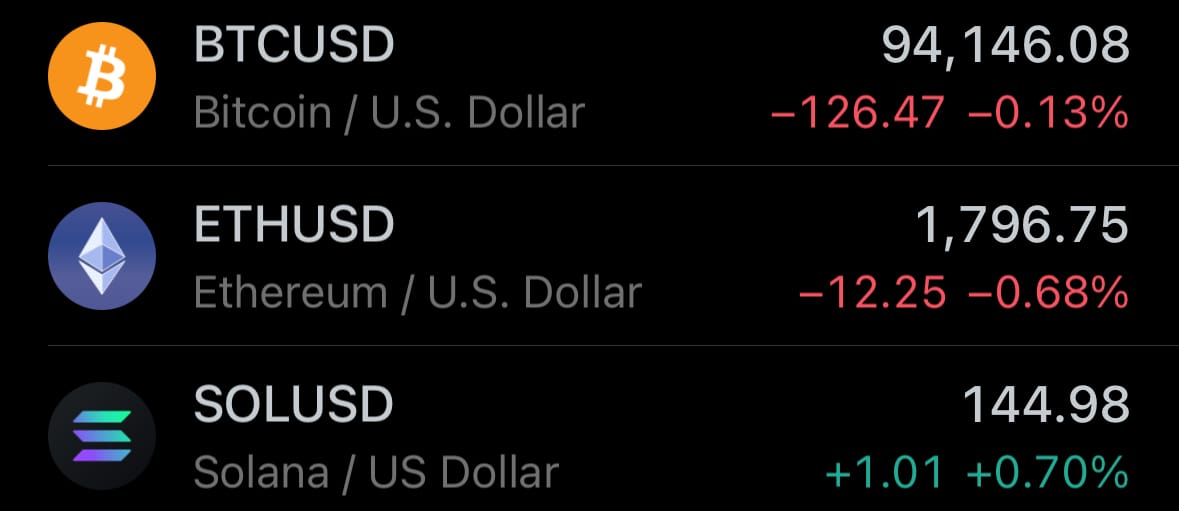
Geopolitics & Military Activity:
- Yesterday, May 4, 2025, a ballistic missile launched by Yemen’s Houthi‘s struck near Ben Gurion International Airport in Tel Aviv, Israel, at 9:30 AM local time. The missile, identified by the Houthis as a “Palestine-2” hypersonic model, landed near Terminal 3’s parking lot, creating a crater and causing minor damage to a road and a vehicle. Eight people sustained light to moderate injuries, mostly from the blast or while seeking cover, with no deaths reported. Air raid sirens sounded across central Israel, and flights at the airport were briefly suspended, with road and rail access disrupted for about an hour.
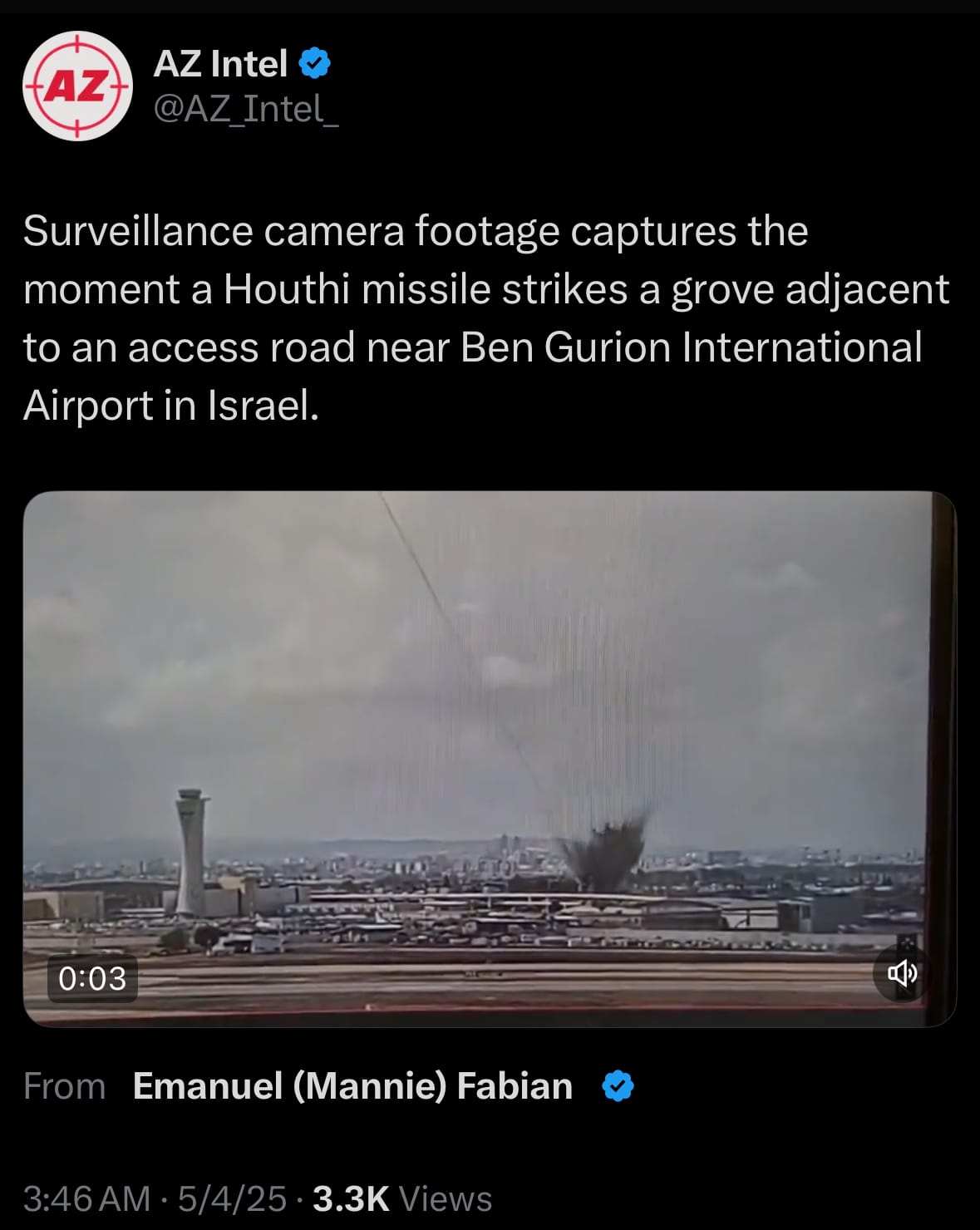
- The Houthis, a Yemen-based group, claimed the attack was in support of Palestinians amid the Gaza conflict. Israel’s air defense systems, including the Arrow system and U.S.-provided THAAD, failed to intercept the missile, prompting the Israeli military to investigate. Unlike the Iron Dome, which counters short-range rockets, Arrow and THAAD are designed to intercept long- and medium-range ballistic missiles, making them relevant to this attack. Several airlines, including Lufthansa and Air France, canceled flights to Tel Aviv through at least May 6. Israeli officials promised a response, while the incident heightened regional tensions and raised questions about the effectiveness of Israel’s missile defense systems.
Environment & Weather:
- Yesterday, May 4, 2025, a hailstorm with heavy rainfall affected multiple areas of Guizhou Province in southwest China, causing disruptions. The storm delivered large hailstones and significant rain, resulting in flash flooding, damage to infrastructure, crops, and vehicles. Urban areas saw flooded streets and traffic delays, while rural regions reported impacts on agriculture. No casualties were reported. The event is consistent with past weather incidents in Guizhou, such as hailstorms in Sandu County in 2024 and Pingtang County in 2020, which also caused property damage.
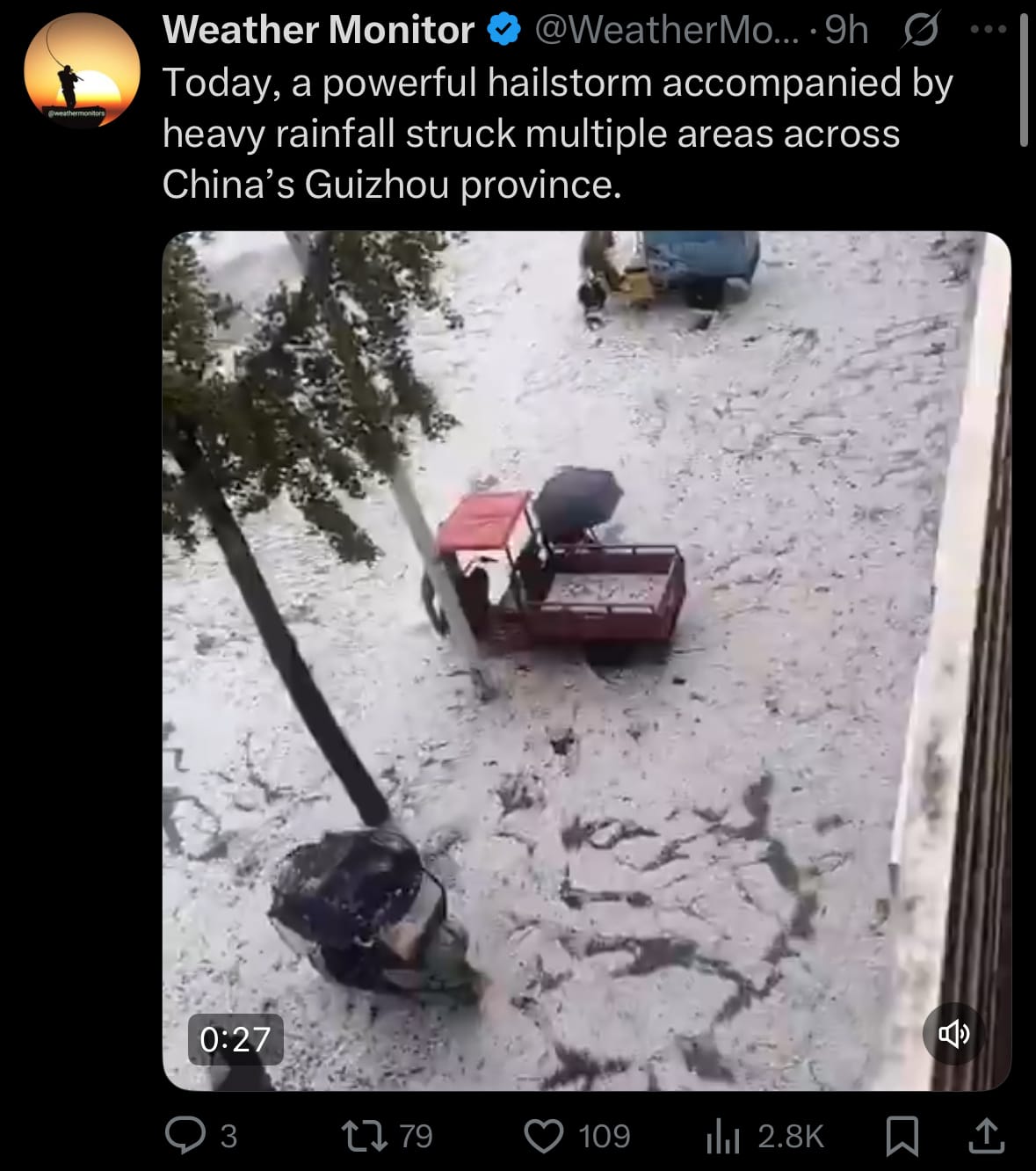
- Guizhou’s subtropical monsoon climate and varied terrain contribute to frequent heavy rainfall, particularly from March to August. The storm’s intensity led to flooding in areas with steep slopes and limited drainage systems. Local authorities are assessing the damage, with economic impacts anticipated based on similar past events. The incident reflects ongoing challenges with severe weather in the region and the importance of addressing infrastructure vulnerabilities.
Space:
- Yesterday, May 4, 2025, SpaceX launched a Falcon 9 rocket from Kennedy Space Center’s Launch Complex 39A in Florida at 4:54 AM EDT (0854 UTC), deploying 29 Starlink satellites into low-Earth orbit. The mission aimed to expand SpaceX’s Starlink constellation, which provides global internet access.
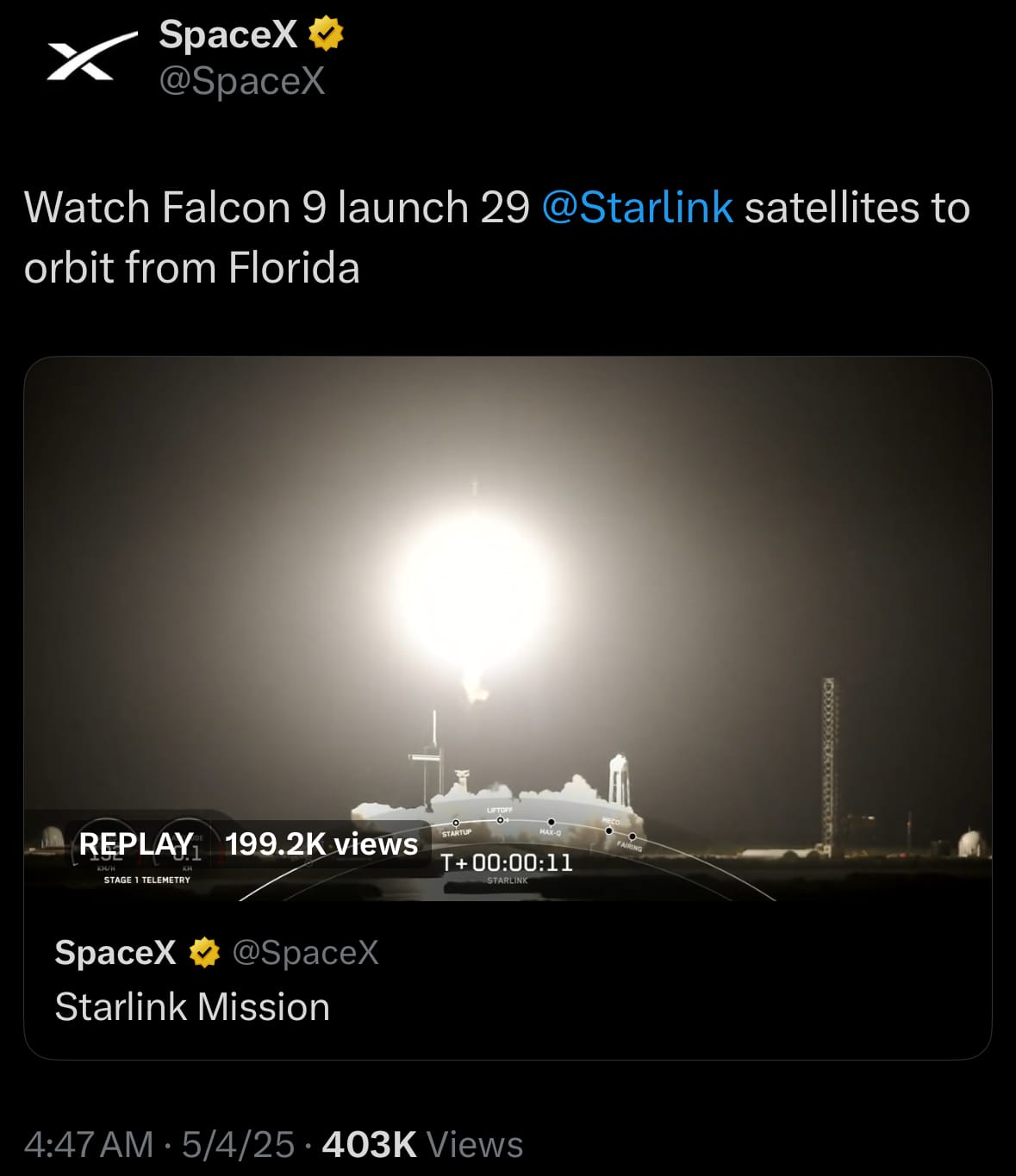
- The first-stage booster, on its 14th flight, landed successfully on a droneship in the Atlantic Ocean, marking SpaceX’s 441st booster landing. This was the company’s 51st Falcon 9 launch of 2025. The satellites, part of the V2 Mini series, contribute to a constellation of over 7,500 units, focused on serving remote areas.
Statistic:
- Largest assets on Earth by market capitalization:
- Gold: $22.020T
- 🇺🇸 Microsoft: $3.235T
- 🇺🇸 Apple: $3.067T
- 🇺🇸 NVIDIA: $2.793T
- 🇺🇸 Amazon: $2.016B
- 🇺🇸 Alphabet (Google): $2.000T
- Bitcoin: $1.870T
- Silver: $1.821T
- 🇸🇦 Saudi Aramco: $1.608T
- 🇺🇸 Meta Platforms: $1.507T
- 🇺🇸 Berkshire Hathaway: $1.164T
- 🇺🇸 Broadcom: $957.50B
- 🇹🇼 TSMC: $929.84B
- 🇺🇸 Tesla: $925.09B
- 🇺🇸 Walmart: $790.08B
- 🇺🇸 Eli Lilly: $739.60B
- 🇺🇸 JPMorgan Chase: $701.74B
- 🇺🇸 Visa: $666.22B
- 🇨🇳 Tencent: $582.84B
- 🇺🇸 SPDR S&P 500 ETF Trust: $520.16B
- 🇺🇸 Mastercard: $508.01B
- 🇺🇸 Netflix: $492.16B
- 🇺🇸 Exxon Mobil: $457.76B
- 🇺🇸 Costco: $447.36B
- 🇺🇸 Oracle: $422.68B
History:
- The history of cyberattacks dates back to the 1970s and 1980s, when early computer networks such as ARPANET experienced their first breaches. The 1986 “Cuckoo’s Egg” incident, where a German hacker infiltrated U.S. military systems, highlighted the national security implications of digital espionage. In the 1990s, cybercrime evolved from individual hackers to organized groups, exploiting vulnerabilities in increasingly networked systems. The rise of the internet brought with it viruses like the “ILOVEYOU” worm and “Melissa” macro virus, causing global disruptions. By the early 2000s, attacks became more financially motivated, with ransomware precursors and banking Trojans targeting businesses and consumers alike.
- In the past two decades, cyberattacks have grown in scale, sophistication, and impact. Notable events include the 2007 cyberattacks on Estonia, the Stuxnet worm that disrupted Iran’s nuclear program in 2010, and the rise of ransomware-as-a-service in the 2010s. Nation-states, hacktivist groups, and cybercriminal syndicates now operate with advanced capabilities, targeting everything from government infrastructure to healthcare and supply chains. Major incidents like the SolarWinds breach (2020), the Colonial Pipeline ransomware attack (2021), and ongoing cyberwarfare in geopolitical conflicts (such as Russia-Ukraine and Israel-Iran tensions) demonstrate how cyberattacks have become tools of both economic disruption and strategic warfare. As of today, the cyber threat landscape continues to evolve rapidly, demanding constant innovation in defense, detection, and resilience strategies.
Image of the day:

Thanks for reading!
Earth is complicated, we make it simple.
Click image to view the Earth Intelligence System:
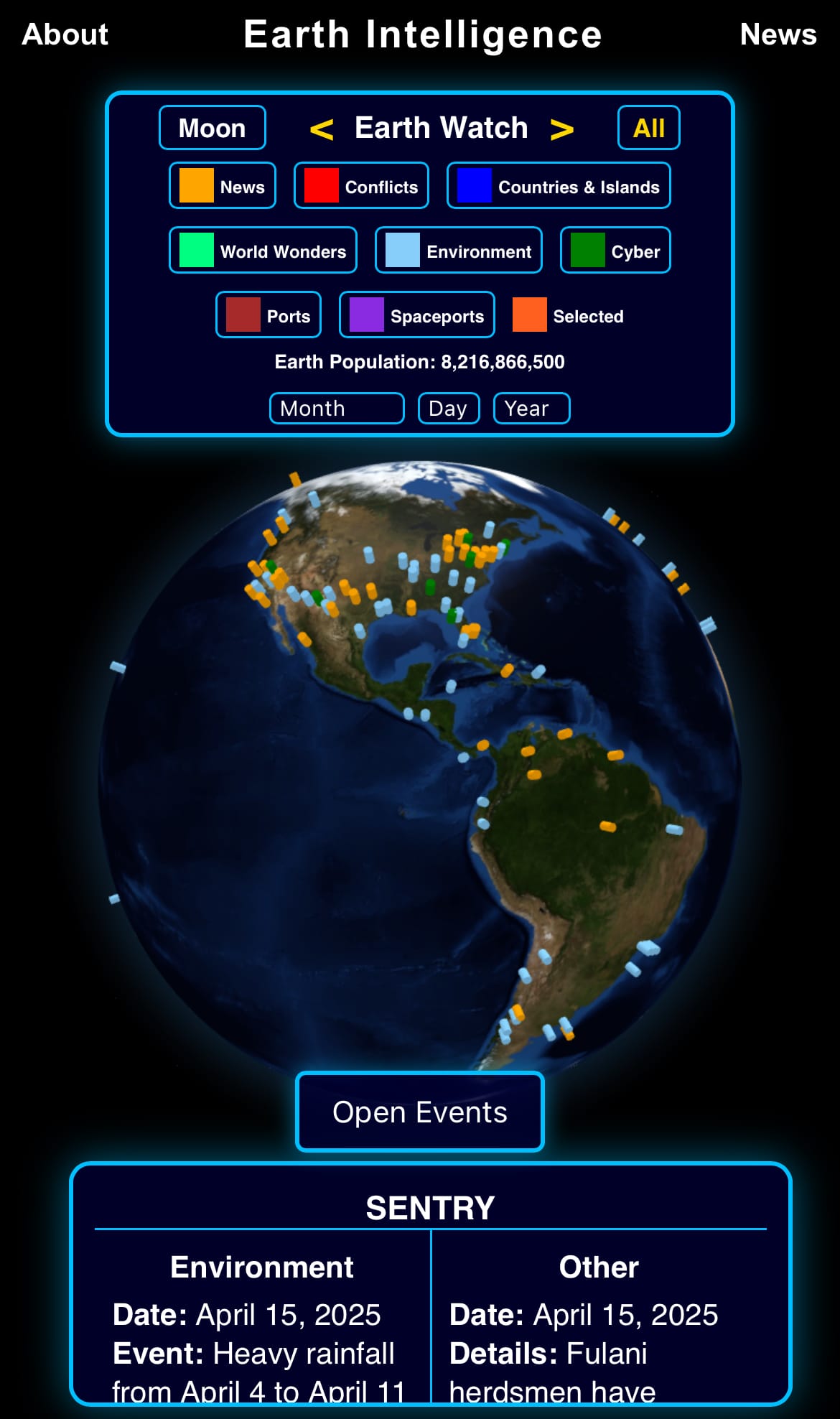


Support/Suggestions Email:
earthintelligence@earthintel.news




